![]()
MEANING: to lose your job
IN CONTEXT: He was caught stealing the company’s stationery, so he immediately got fired.
To get fired originated from a time in England when miners carried their own tools from job to job. Like today, stealing was a serious offence, and any miner caught taking valuable materials, such as coal, tin, or other ore, was immediately dismissed. So as to prevent them repeating their crime in another employment, their tools would also be confiscated and burned at the plant in full view of all the workers—their tools would literally get fired. Some suggest that the actual offender was set on fire in these instances, but it was likely just his tools. To get fired was far harsher and more humiliating than to get the sack (page 56), and was always the result of malicious behavior.
![]()
MEANING: a state of disorder or confusion
IN CONTEXT: We hadn’t slept for over a day so we were at sixes and sevens by the time we went to bed.
At sixes and sevens has its origins in the London livery companies. All the way back in 1327, The Worshipful Company of Merchant Taylors and The Worshipful Company of Skinners each received their charter within a few days of each other. They were the sixth and seventh companies listed. A dispute immediately arose as to which company would be placed sixth when the various companies went on processions around the city. The debate raged, but it was finally agreed that the two companies would swap between sixth and seventh place each year, resulting in confusion for some observers.
![]()
MEANING: to get very angry; lose one’s temper
IN CONTEXT: He’s got such a bad temper. He flies off the handle for no reason at all.
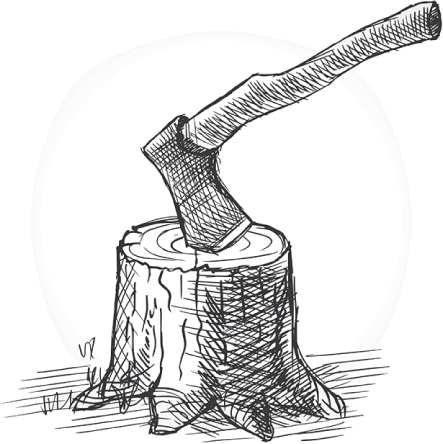
Fly off the handle is an expression that began with the early American frontier settlers. The iron head of an ax has a hollow area into which the wooden handle is inserted. The handle is tightly fitted, but in conditions when the atmosphere is very dry, like in middle America, the wood can shrink and the ax head loosens. When being vigorously swung, the ax head can sometimes fly off from the handle in an uncontrolled manner. Such a piece of iron hurtling through the air could be very dangerous. The phrase was first seen in the written form in 1843 in Thomas C. Haliburton’s The Attaché; or, Sam Slick in England.
![]()
MEANING: to finish work
IN CONTEXT: He’d put in a solid day’s work so I told him he could knock off early.
Knock off work has its beginnings with the American slave trade in the early 19th century. River boats transported slaves to and from the plantations. These boats were rowed by the slaves themselves. To keep the men rowing in unison, a drummer would beat out the rhythm on a block of wood. When it was time to change shifts, he would knock off a distinctive hit to signify it was time to stop. This was later used in English factories, where knocking a mallet on a wooden workbench indicated the end of a shift.
![]()
MEANING: acceptable; up to the required standard
IN CONTEXT: The restaurant promised quality burgers, and I had to admit that they were up to the mark.
Often used in the negative, up to the mark originated in 1697 when the Britannia standard was introduced. It provided that all gold and silver that satisfied a certain level of purity be stamped with a hallmark by the assay office. This proved the authenticity of the material and became a sign to jewelers and buyers that it was genuine. In the beginning, all precious metals were inspected at Goldsmiths Hall in London before the inspection process spread to other locations. If a metal was not considered of the required standard, it was rejected as not being up to the hallmark. This expression was later shortened, and people spoke of the metals being up to the mark or not.
![]()
MEANING: against the natural flow; opposed to one’s inclination
IN CONTEXT: We followed our partner’s advice to invest, although it went against the grain.
Against the grain has its origins in the field of woodwork and carpentry. When wood is planed, sawed, or sanded along the grain, it results in a smooth finish. However, when done against the grain, or obliquely to it, the wood will tend to splinter or be rough. Working against the grain is also far more difficult and strenuous. The first written use of this expression was by Shakespeare in Coriolanus in 1607.
![]()
MEANING: having the same faults or bad qualities
IN CONTEXT: They’re politicians so they’re both dishonest—they’re all tarred with the same brush.
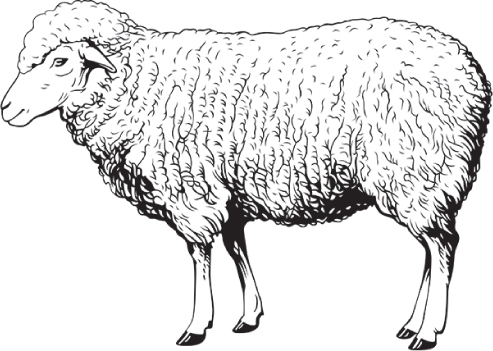
Often used in a derogatory sense, tarred with the same brush has its origins in early sheep farming. It was common for a number of sheep within any flock to develop sores from time to time. These sores were usually treated with a coating of tar, which was applied with a brush. The same brush was used on every sheep with an infection, but it was important never to use it on a healthy sheep so as to prevent the contamination of a healthy animal with a sullied brush. This way, it was only the infected sheep that were tarred with the same brush. The term became a commonplace expression by the early 19th century.
![]()
MEANING: wearing very fashionable or expensive clothes
IN CONTEXT: It was an upscale restaurant so Joanne was dressed to the nines.
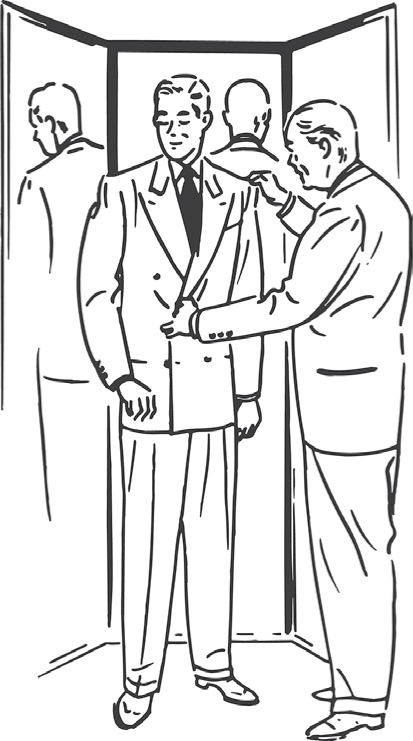
The origin of dressed to the nines is one of the most disputed in all of phraseology. While many argue against it, it is likely that the saying derives from clothing. Tailors require a great deal of fabric to make the best suits, because all the fabric must be cut in the same direction and the thread of the cloth must be parallel with the vertical line of the suit. This results in a lot of waste; nine yards’ worth of cloth is usually needed. An alternative explanation is that the phrase relates to the 99th Wiltshire Regiment from the mid-19th century in England. They were known as “The Nines,” and were particularly noted for their exquisitely smart uniforms and presentation.
![]()
MEANING: to see what happens
IN CONTEXT: He’d put in his best effort at the performance but he had to wait a week to see how the results panned out.
See how it pans out is another expression that began with the mining industry. During the California Gold Rush of the mid-1800s, the early prospectors used the simple technique of panning to look for gold in the rivers and streams. A deposit of sand and gravel from a creek bed was scooped into a small metal pan, and then it was gently agitated with water so that the lighter sand washed over the side while the heavier gold remained in the bottom of the pan. A prospector would wait and hope to see how each attempt panned out.
![]()
MEANING: to get off unpunished or without obligation
IN CONTEXT: He was caught stealing, but he got off scot-free and the judge only gave him a warning.
Get off scot-free has nothing to do with the Scottish, but derives from the Old English word scotfreo, meaning “exempt from royal tax.” First used in the 11th century in medieval England, a “scot” was a tax levied on homeowners according to the size and quality of their land. Poor people whose houses were in unfavorable positions didn’t have to pay the tax—they got off scot-free. By the 16th century, innkeepers also used a slate called a scot to mark up the drinks someone had consumed. To leave without paying was known as getting off scot-free. The saying developed further to mean getting away with anything at all.
![]()
MEANING: mediocre; okay
IN CONTEXT: The concert performance was fair to middling, but it could have been a lot better if the lead singer was on form.
Fair to middling originated in the cotton industry in America in the 19th century. Cotton varied in quality and the better it was, the more it could be sold for. To facilitate this process, commercial cotton was graded in categories ranging from good to poor. Middling was an average grade, just below fair in quality. If the cotton was classed as fair to middling, it wasn’t considered the best, but it was a little above average. The expression came to generally mean moderately good and was used from the late 1800s.
![]()
MEANING: exactly right, or exactly what is needed
IN CONTEXT: We need a big car for all our luggage and the SUV was just the ticket.
Some believe that’s just the ticket is a corruption of the French word etiquette, meaning “proper behavior,” but the more likely origin is from the early 20th century, when tickets were distributed to the poor to provide them with essential items such as food and clothing. The tickets were specific to the goods being sought and would be exchanged with shopkeepers, who were known to say “that’s just the ticket” when the person produced the correct one. This practice continued during and after World War II, when ration booklets were used for the same purpose.
![]()
MEANING: to speak frankly and plainly
IN CONTEXT: With the formalities of the meeting out of the way, it was time to talk turkey.

Talking turkey began in colonial times when the European settlers encountered the Native American Indians. Wild turkeys lived among the Indians and were soon considered a high-demand delicacy, and were often put up for barter. There is one account about this from an 1837 article in the Niles’ Weekly Register. It recorded that an Indian and a white man went shooting one day and all they got was one turkey and one crow. Desperate for the turkey, the white man bargained with the Indian by saying, “You may have your choice: you take the crow and I’ll take the turkey; or, if you’d rather, I’ll take the turkey and you take the crow.” The Indian thought about this and then replied, “Ugh. You no talk turkey to me a bit.” The bargaining for turkeys that took place on a daily basis then became known as talking turkey. This soon came to mean any serious discussion.
![]()
MEANING: to pay for something; to pay the check
IN CONTEXT: My boss took me out to lunch and the firm footed the bill.
Foot the bill began in the 1400s and derived from the simple method of adding up the various components of a check, or bill, and writing the total at the bottom, or foot. Originally meaning to total the account at the foot, by the 1800s it had changed to today’s colloquial use, which is to pay the check rather than add it up.
![]()
MEANING: to be very poor
IN CONTEXT: Kevin lost his job and after his savings ran out, he was on the breadline.
On the breadline originated in America in the 1860s. Charles and Maximilian Fleischmann were brothers who revolutionized the baking industry and created the first commercially produced yeast. Their bakery in New York was also famous for the freshness and quality of its bread. While other bakeries would use any leftover bread to sell to the next morning’s customers, the Fleischmanns would give away any unsold bread to the poor of the city. At the end of each day, a line of starving people would form outside the bakery and wait for the free bread.
![]()
MEANING: an ineffective person or business; a weakling
IN CONTEXT: The new company CEO had no idea what he was doing. He was a complete lame duck.
Lame duck dates from the mid-1700s and began in the financial world. It originated with the London Stock Exchange and applied to those who were bankrupt and could not pay their debts. They were forced to waddle out of Exchange Alley in disgrace, like lame ducks. The first known mention of the term in writing was by Horace Walpole’s 1761 letter to Sir Horace Mann where he wrote: “Do you know what a Bull and a Bear and a Lame Duck are?” The expression transferred to America in reference to ineffectual politicians by the mid-1800s.
![]()
MEANING: do something without planning, deciding on the course of action as you go along
IN CONTEXT: Most stock investors don’t plan too much, they just fly by the seat of their pants and hope for the best.

Related to the expression “on the fly,” fly by the seat of your pants derives from the world of aviation in the 1930s. Early aircraft had few navigational aids or sophisticated instruments. Flying was predominantly based on the pilot’s judgment and feel of the plane. The largest point of contact between the pilot and the plane is the seat, so most of the feedback comes through the seat to the pilot. It was through the seat that the pilot could feel the reactions of the plane and fly it accordingly. The term (which was originally fly by the seat of your trousers, showing it had British origins) came into prominence in relation to Douglas Corrigan’s 1938 flight from America to Ireland. In that flight, some of the plane’s systems failed and Corrigan was forced to fly by the seat of his pants.
![]()
MEANING: to reluctantly take the blame for something that has gone wrong and was not necessarily your fault
IN CONTEXT: Rich felt he was always carrying the can for his boss’s mistakes.
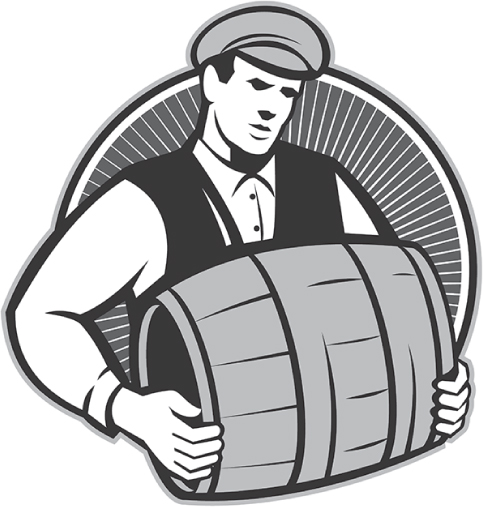
Carry the can began with beer and soldiers. For years on military bases, it was the job of a low-ranking soldier to fetch the beer. He would be required to carry a large bucket (or can, in British English) of beer from the mess hall to a group of drinking men. The man carrying the can was responsible for both bringing in the beer and returning the empty can for refilling. Despite the menial nature of the job there was a great reluctance to undertake it, because if the slightest drop was spilled, the man was open to much ridicule.
![]()
MEANING: crazy or completely mad
IN CONTEXT: Old Fred has finally gone senile and is as mad as a hatter.
Mad as a hatter stems from the 18th-century practice of using mercury nitrate in the making of felt hats. Mercury nitrate is a highly toxic chemical and exposure to it often affected the nervous systems of hat makers, causing them to tremble and jitter. This led many to believe that the hatters were crazy, so the expression mad as a hatter developed. In fact, mercury poisoning is still known today as “mad hatter disease.” While not being the origin of the phrase, it was popularized by the eccentric Mad Hatter character in Lewis Carroll’s 1865 work Alice’s Adventures in Wonderland.
![]()
MEANING: having no money at all
IN CONTEXT: He went to pay the check at the restaurant when he realized he was stone broke.
Stone broke stemmed from medieval England when an inability to pay your debts was considered a cardinal sin and was the reason for many suicides. If skilled tradesmen failed to repay their debts, their tools would be repossessed and their stone work benches broken into pieces. This practice rendered the tradesmen unable to work. Coupled with this, offenders were sometimes sentenced to hard labor in prison, where they were forced to break up stones and rocks. Being stone broke later became associated with anyone who had no money.
![]()
MEANING: obviously dead; not at all active
IN CONTEXT: Nothing ever happens in our little town. It’s as dead as a door nail.
Dead as a door nail dates from around 1350 and relates to the trade of carpentry. At the time, metal nails were hand-tooled and costly. Wooden pegs were often used as a cheaper alternative, but in the homes of the wealthy, large-headed nails were used in the doors to make them stronger and able to wear the repeated opening and closing. The practice was to hammer the nail through the wood and then bend the protruding end over to secure it flat against the wood. This process was called clinching, and afterward the nail was “dead” and could not be used again. Charles Dickens referred to the phrase in his 1843 book A Christmas Carol.
![]()
MEANING: to completely trust or rely on someone
IN CONTEXT: Jordan was a strong defender and we could always bank on him to make the tackle.
Bank on someone is an expression that began in medieval Venice before the days of modern banks. At the time, Venice was the hub of world trade and men set up benches in the main plazas to trade the various world currencies that appeared in the city from merchants and travelers. These men acted like banks, and the Italian word for bench also happens to be banco. Traders would exchange currencies with these men, borrow from them, and even leave money with them while they were away. The men had high scruples and were universally trusted. They were regarded as men who could be banked on.
![]()
MEANING: very wealthy
IN CONTEXT: The filthy rich may be able to afford that sort of vacation, but I can’t.
Filthy rich derives from “filthy lucre,” an expression used since the 16th century. The word “lucre” means money and comes from the Latin lucrum, meaning profit. Filthy lucre was first used by the English scholar, William Tyndale, in his translation of the New Testament (Titus 1:11), where it meant money gained dishonorably. By the 1920s in America, money was jokingly referred to using the slang term “the filthy,” and from there the very wealthy were soon called the filthy rich. In modern times, the negative connotations have softened and the expression is used to refer to anyone who is rich, rather than just those who obtained their money by dubious means.
![]()
MEANING: average or ordinary
IN CONTEXT: There was nothing special about the jazz musicians—they were just run of the mill.

Run of the mill originated with the early milling towns of England. These great mill towns mass produced wool and cotton, which was exported all over the world. It was an extremely large industry, and a mill’s reputation and profitability was primarily based on the quality of the material it produced. Quality control checks were essential before the material could be sold, but anything coming directly from the mill without having been inspected and graded was known as run of the mill and was considered inferior and prone to imperfections.
![]()
MEANING: give away a secret
IN CONTEXT: Phil finally let the cat out of the bag and told us his wife was pregnant.
Dating from as early as the 16th century, letting the cat out of the bag derives from a time when unscrupulous market vendors sold false goods. One of their common deceptions was to substitute a worthless cat for a valuable pig. After showing the unwitting buyer a sought-after suckling pig, negotiations on price would begin and the pig would be placed in a carry bag. At some point when the buyer was distracted, the pig would be replaced for a cat. It was only when the duped buyer got home that the fraud was revealed when he let the cat out of the bag.
![]()
MEANING: to behave wildly; a complete mess
IN CONTEXT: The office computers went haywire and we ended up paying everybody twice.
Gone haywire owes its origins to the early 1900s in America. At the time, a strong and light metal wire was used to bale up hay. The wire was tautly affixed and, once cut, would spring and quickly tangle. The wire was only intended to be used for baling, and once removed, it was rendered useless and was usually discarded. However, some farmers would use the rusted wire to make boundary fences or mend tools or machinery. It was not suitable for these measures and generally resulted in giving the farm an unkempt and disorderly appearance.
![]()
MEANING: to make a start or pave the way
IN CONTEXT: It was a very formal and tense dinner party, but I decided to break the ice by making a joke.

Dating from the early 17th century, break the ice relates to ship navigation. Before the development of road networks, ships were used as the main source of trade and transportation. During winter, many rivers and channels would freeze over and the ships would get stuck, unable to pass. As a gesture of goodwill, the receiving port would often launch small ships to break the ice and clear a path for the larger vessels. Specialist ships known as icebreakers were later developed and used for the exploration of the polar regions. These ships had powerful engines and reinforced hulls.
![]()
MEANING: betrayed, cheated, or misled
IN CONTEXT: I kept the whole day free because Jim had promised me a ticket to the baseball game, but he sold me down the river and gave it to someone else.
Sold down the river derives from the time of slavery in America. In the early 19th century when the slave trade was in full swing, wealthy estate owners in the northern Mississippi region would handpick the best slaves to live and work on their properties. These slaves were in close contact with the landowner’s family, living on the property and preparing meals. The lives of these slaves were somewhat comfortable (relatively speaking)—they were often treated well, and were sometimes seen as respected members of the family. But any slave who caused trouble or was considered unsuitable for the landowner’s family was put on a boat and sold down the river to the slave labor plantations on the lower Mississippi. There the conditions were much harsher, and life was cheap.
![]()
MEANING: honest; reliable; trustworthy
IN CONTEXT: You can believe him as he’s on the level.
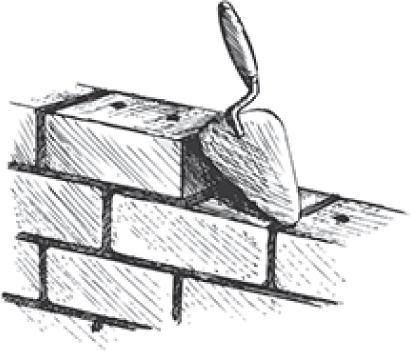
On the level began with the freemasons, skilled stone workers of the 14th century. In any construction, it was acknowledged that a perfectly flat base was essential if the building was going to be structurally sound and of high quality. They developed an instrument known as a level, which was used to ensure a flat and true base from which to work. The level symbolized integrity in the building process, and on the level was soon adapted into the wider sense that is used today.
![]()
MEANING: dwindle or diminish; come to an end
IN CONTEXT: He worked hard at first but his enthusiasm soon petered out.
Some suggest that peter out derives from biblical times and refers to the apostle Peter. When Jesus was arrested, Peter strenuously defended Christ, but by the next morning his enthusiastic support quickly diminished to the point that he even denied knowing Jesus. However, the likely origin of the phrase is from the early days of gold mining in America. Potassium nitrate, known as saltpeter, was a mineral ingredient in the explosives used in mining. When all the gold in a mine was exhausted, it was said to have petered out because the explosives had dwindled it down until nothing was left. The expression was being used literally and figuratively in America by the 1840s.
![]()
MEANING: to abruptly intrude or interrupt
IN CONTEXT: His mother never knocks on his bedroom door. She just barges in.
Barge in began with the early days of transportation in England, before railways existed. The major towns of the country were connected by a network of waterways that allowed the movement of goods. The water was not very deep and the boats used on these waterways were flat-bottomed barges. This was the case since the 17th century and still continues today. The barges were cumbersome and awkward to steer, making collisions common as the vessels often barged in. The expression had gained its colloquial usage by the early 1900s.
![]()
MEANING: you never get anything for nothing; there is always a hidden cost
IN CONTEXT: The store gave my son a free toy but I had to buy ten expensive batteries for it, which made me realize there is no such thing as a free lunch.
No such thing as a free lunch began during the 1840s in America. Bars and restaurants at the time began offering a free lunch to any customer who’d buy a drink. However, the free lunch was usually something insubstantial like a salty snack, which did little more than encourage the patron to drink even more and thus spend more money. It soon became apparent that after a free lunch, people were spending more money than if they’d just paid for a proper lunch in the first place. This technique became a lucrative way for establishments to make money, and many even advertised the free lunch in local newspapers.
![]()
MEANING: a lot to be done; a difficult time lies ahead
IN CONTEXT: The government job required an enormous bid, so we knew we had our work cut out for us if we were to win it.
Our work cut out for us began in the 1800s when tailors began streamlining their operations. Traditionally a tailor would make a suit using one large piece of cloth, cutting the material and then stitching as he went. In order to make the work more efficient, the practice developed where a tailor’s assistants would cut out the various patterns beforehand, leaving the tailor to stitch them together. At first this would seem to make the tailor’s job easier, but it resulted in piles of cut material heaping up for the tailor to stitch. This made it difficult for the tailor to keep up, so if he had his work cut out for him, he had a very busy time ahead. The expression was first used metaphorically by Charles Dickens in his 1843 novel A Christmas Carol.
![]()
MEANING: to be far inferior to someone or something else
IN CONTEXT: Jeff is a fast runner, but he can’t hold a candle to George.
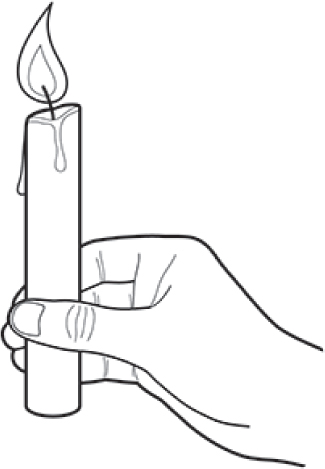
Hold a candle dates back to the time before electricity. Usually expressed as “not fit to hold a candle” or “couldn’t hold a candle,” unskilled workers or apprentices were expected to hold a candle so that more experienced craftsmen had light while they undertook their work. Holding a candle was obviously not a very challenging role, so being told that you were not even fit to do that task placed you at the very bottom of the pecking order and as vastly inferior to the craftsman at work.
![]()
MEANING: to live frugally, just within your means
IN CONTEXT: On such a low salary, Paul was only just able to make ends meet.
Make ends meet has its origins in the world of accountancy. From the 17th century, meet was an accounting term meaning match or balance. A bookkeeper’s ledger contained two columns—one for expenditure and one for income. The ends were the bottom figures of those two columns. To make ends meet was to match the expenditure and income figures so that the books were balanced. By the mid-18th century, the phrase was in common usage in England in the figurative sense.
![]()
MEANING: to support more than one person or outcome to minimize the possibility of losing
IN CONTEXT: He hedged his bets and invested in both stocks and real estate.
Hedge your bets originated in 17th-century England. Landowners at the time would enclose pieces of their land by planting a row of trees and then pruning them to form a hedge. These hedges were normally made from the spiny Hawthorn bush, which formed an impenetrable barrier. This method acted as a means of protection against escaping animals. The hedges made the farmer’s land more secure and limited his risk. The expression was first used in a financial sense as hedging one’s debts in 1607 in John Donne’s Letters to Sir Henry Goodyer.
![]()
MEANING: going at a very fast pace
IN CONTEXT: Lisa was very excited after getting her promotion at work, so she was talking nineteen to the dozen.
Nineteen to the dozen originated in the Cornish copper and tin mines in 18th-century England. Pumps were a necessary piece of equipment at the mines and were used to clear out the excess water that had been used in the mining or that had come in as a result of flooding. Hand pumps were used to clear the water until the advent of steam-driven pumps. While the traditional hand pumps were slow and labor intensive, the steam pumps were fueled by coal and were highly efficient. When running at maximum capacity, they could clear 19,000 gallons of water for every twelve bushels of coal burned.
![]()
MEANING: to lose your job
IN CONTEXT: There was a downturn in business so we had to give Stephen the sack.
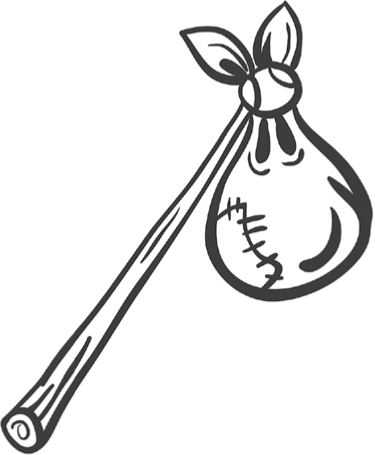
To get the sack derives from a time when tradesmen traveled from place to place looking for work. They generally owned their own tools and carried them around in a large sack. Work was often irregular, so the tradesmen never knew how long they might be employed. At the start of any given job they would hand over their sack to their employer to look after. The employer would keep the sack for the duration of the tradesman’s employment. If the tradesman’s services were no longer required and he was dismissed from the job, the employer would give him the sack.
![]()
MEANING: the illegal buying or selling of goods to avoid governmental control; a place where illegal business is carried on
IN CONTEXT: I just bought all the latest music for next to nothing on the black market.
While there is some conjecture as to the origin of black market, the expression likely owes its beginnings to medieval England. At the time, nomadic mercenaries traveled the country selling their fighting skills to the highest bidder, usually noblemen who were raising armies. These men were weather-worn soldiers who lived solitary lives in the wilderness. Their armor was rarely polished, and being subjected to the elements, would oxidize into a blackish hue. As a result, they became known as the Black Knights. For sport, the Black Knights would sometimes compete in jousting matches against local men at country festivals, in which the winner would win his opponent’s armor and weapons. Rather than carry around two sets of armor, the Black Knights would sell their spoils back to the loser, who would buy it at a cut-rate price. This aftermarket became known as the black market.
![]()
MEANING: a state of complete disorder or ruin
IN CONTEXT: The mining boom was over and the economy was in a shambles.
In a shambles derives from the open-air meat sellers of medieval times. The word “shambles” derives from the Old English word sceamol, meaning footstool, which came from the Latin scamillum, meaning small bench. Most towns at that time in England had streets designated to a single type of vendor. There were streets for grocers, bread sellers, and butchers, who all offered their wares from street-side workbenches. These streets were known as shambles, but it was the butchers that became particularly associated with the term. As they were supplied directly by the slaughterhouses, the meat shambles were renowned for being a complete mess of blood and offcuts. By the 1400s, the word “shambles” had become synonymous with general mess and disorder. The town of York in England to this day has a street called Shambles.
![]()
MEANING: to live or work at a hectic pace
IN CONTEXT: My final school assignment is due in a week so I’ve been burning the candle at both ends to get it finished.
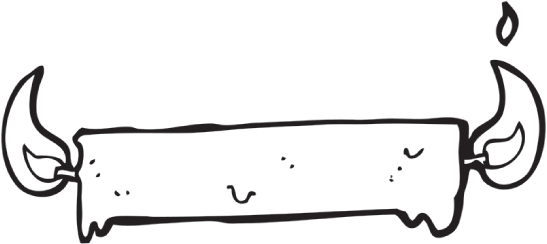
To burn the candle at both ends began in France in the 1600s where it was written as brûler la chandelle par les deux bouts. The expression originally referred to domestic wastefulness. A candle was a valuable item, and to burn it at both ends would make it dwindle away quickly. The expression changed when it moved to England. In the days before electricity, tradesmen working late would secure their candles horizontally and light both ends. This would provide more light for them to work by, but it wouldn’t last as long so they had to work faster. This also gave rise to the analogy of “burning up” your health by working too hard.
![]()
MEANING: as loudly as possible; using full power
IN CONTEXT: The car stereo was on full blast so I couldn’t hear a word the driver was saying.
At full blast dates to the days of the Industrial Revolution in the 18th century. Iron and other metals were essential commodities, and factories used huge blast furnaces to smelt the metals. Fuel was continuously supplied through the top of the furnace, while a hot blast of air was blown into the lower section, causing chemical reactions to produce molten metal. When the furnace was operating at full capacity and producing as much iron as possible, it was considered to be at full blast.